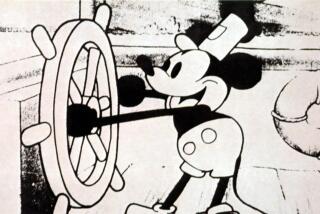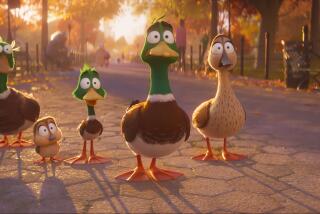MOVIE REVIEW : ‘Duck Tales’ Makes Mockery of Tradition
- Share via
Walt Disney Studios’ new animated film “Ducktales: The Movie: The Secret of the Lost Lamp” (citywide) looks exactly like what it is: A television program that’s been padded and Spielberg-ized in an unsuccessful attempt to make it fit a theater screen.
A comedy-adventure in which the comedy isn’t funny and the adventures aren’t exciting, “Duck Tales” is based on the studio’s syndicated weekday television show. In just 73 minutes, the filmmakers manage to trash both the Disney tradition of excellence in animation and the Carl Barks comic books on which it is supposedly based.
A former Disney story man, Barks created Duckburg and “Umpteen Centrifugilillionaire” Scrooge McDuck in a series of comic books beloved by the baby boomers who grew up reading them during the ‘50s. Barks’ stories always began with some mundane incident--Donald Duck trying to borrow the money for an ice cream soda from Uncle Scrooge--and gradually built to a fantastic climax that might involve the Gilded Man of El Dorado, the fabulous candy-striped ruby or the Abominable Snowman.
“Duck Tales” begins by dumping the viewer into an ancient temple shamelessly lifted from the “Indiana Jones” movies, complete with outsized carvings, huge sliding panels of stone, a hidden corridor lined with booby traps and a secret tunnel to a roller coaster ride of an underground stream.
Uncle Scrooge (voice by Alan Young), Huey, Dewey and Louie, Launchpad McQuack and the ickily cute Webbigail are searching for the lost treasure of Collie Baba. Producer-director Bob Hathcock and writer Alan Burnett may know who Collie Baba was when he amassed this fortune, or what set Scrooge in quest of it, but they don’t bother to share the information with the audience.
The rediscovered treasure is stolen by Baba’s centuries-old enemy, Merlock the Wizard (Christopher Lloyd) and his cowardly sidekick, Dijon (Richard Libertini). A cringing stereotype in the “a thousand pardons, sahib” mold, Dijon will offend anyone of Middle Eastern descent who sees the film. Webbigail saves an old lamp from the treasure, which--surprise!--contains a genie (Rip Taylor, trying much too hard to be hip). After some standard kidvid adventures, Merlock is defeated, and the genie gets his wish: to become a real boy.
But we’re a long way from “Pinocchio.” The film was made in France by a European crew, and though the animation is better than the TV program, it doesn’t begin to approach the quality level audiences expect from Disney. Scrooge and his nephews gesture a lot, but their movements don’t express their personalities.
“The Secret of the Lost Lamp” will probably make money from the elementary school children who watch the “Duck Tales” show, although it’s unlikely their older siblings or parents will want to sit through it with them. But can those few dollars compensate for the damage to the prestige of the Disney name? For 53 years, from “Snow White and the Seven Dwarfs” to “The Little Mermaid,” the Disney studio has been identified with the very best feature animation: “Duck Tales: The Movie” suggests that identification has become a thing of the past.
More to Read
Only good movies
Get the Indie Focus newsletter, Mark Olsen's weekly guide to the world of cinema.
You may occasionally receive promotional content from the Los Angeles Times.










